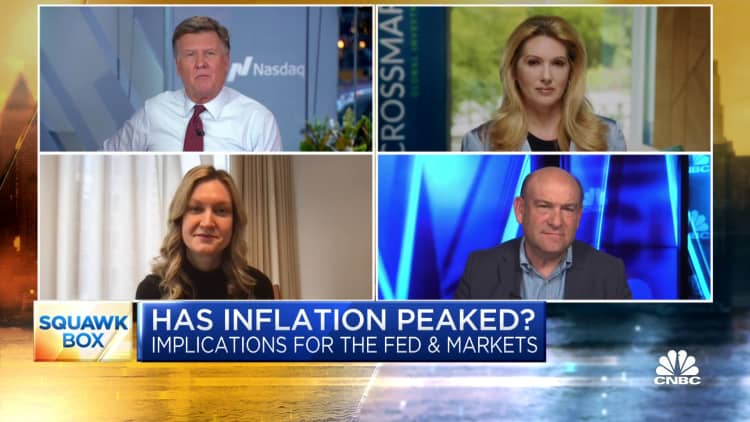Consumer Sentiment Weakened Sharply in November
- The University of Michigan Survey of Consumers posted a 54.7 reading for November, down 8.7% from the previous month’s reading and well below the estimate.
- The survey noted a particular slide in views on spending for durable goods — big-ticket items such as televisions, kitchen appliances and motor vehicles. The index for that group fell 21%.
Higher interest rates, a potential recession and persistently high prices made consumers substantially less confident about the current state of the economy as well as where things are heading, according to a closely watched sentiment gauge released Friday.
The University of Michigan Survey of Consumers posted a 54.7 reading for November, down 8.7% from the previous month’s reading of 59.9. That was well off the Dow Jones estimate, which forecast the number to be little changed at 59.5.
Along with that reading, the current economic conditions index fell 11.9% to 57.8. The index of consumer expectations, which looks at where respondents see things heading in six months, tumbled 6.2% to 52.7.
On an annual basis, the headline index reading fell 18.8%, while the current conditions measure was off 21.5% and the future expectations measure slid 17%.

The University of Michigan release comes a day after the Bureau of Labor Statistics reported that the consumer price index rose 0.4% in October, below the 0.6% estimate. That news set off a wild rally on Wall Street, where sentiment rang high that the Federal Reserve could ease the pace of interest rate increases as inflation shows signs of leveling off.
“For now, both inflation and higher borrowing costs are squeezing household spending,” said Jim Baird, chief investment officer at Plante Moran Financial Advisors. “For low-income households in particular, higher prices for essentials limit discretionary spending, crimp savings, and contribute to higher credit card debt.”
The survey noted a particular slide in views on spending for durable goods — big-ticket items such as televisions, kitchen appliances and motor vehicles. The index for that group fell 21% as consumers were wary of rising borrowing rates and elevated prices.
Durable goods purchases have been on the decline since mid-2021, falling the past two quarters after exploding in the early days of the Covid pandemic.
“Better news on October inflation didn’t come in time to provide a boost to sentiment, which declined unexpectedly,” Baird added. “The economy may not be in recession, but for households struggling under the weight of higher prices, it certainly feels like it for many.”
Inflation expectations edged higher in the month despite October’s CPI reading, which showed that year-over-year prices rose 7.7%, compared to 8.2% the previous month.
The one-year inflation outlook rose to 5.1%, the highest level since July, while the five-year gauge rose to 3%, the highest since June. Those readings have remained in a tight range for most of the year, starting 2022 respectively at 4.9% and 3.1%.
But those are high by historic terms and come as the Fed has boosted its benchmark interest rate by 3.75 percentage points since March. Friday’s survey shows consumers, whose spending comprises 68% of U.S. GDP, are wary heading into the pivotal holiday shopping season.
“Consumers managed to hold their heads above water earlier this year when gasoline prices were peaking at well above $5 per gallon,” wrote Paul Ashworth, chief North America economist at Capital Economics. “But it will be harder for them to shrug off high interest rates given that the household saving rate is already at an unusually low level.”
The sentiment index reached its historic low in June as worries accelerate that the U.S. already was in recession or heading for one. GDP rose at a 2.6% annualized pace for the third quarter, helping to assuage some anxiety over a contraction after the first two quarters saw negative readings, but many economists still expect the U.S. to hit a recession in 2023.
" Conservative News Daily does not always share or support the views and opinions expressed here; they are just those of the writer."


Now loading...